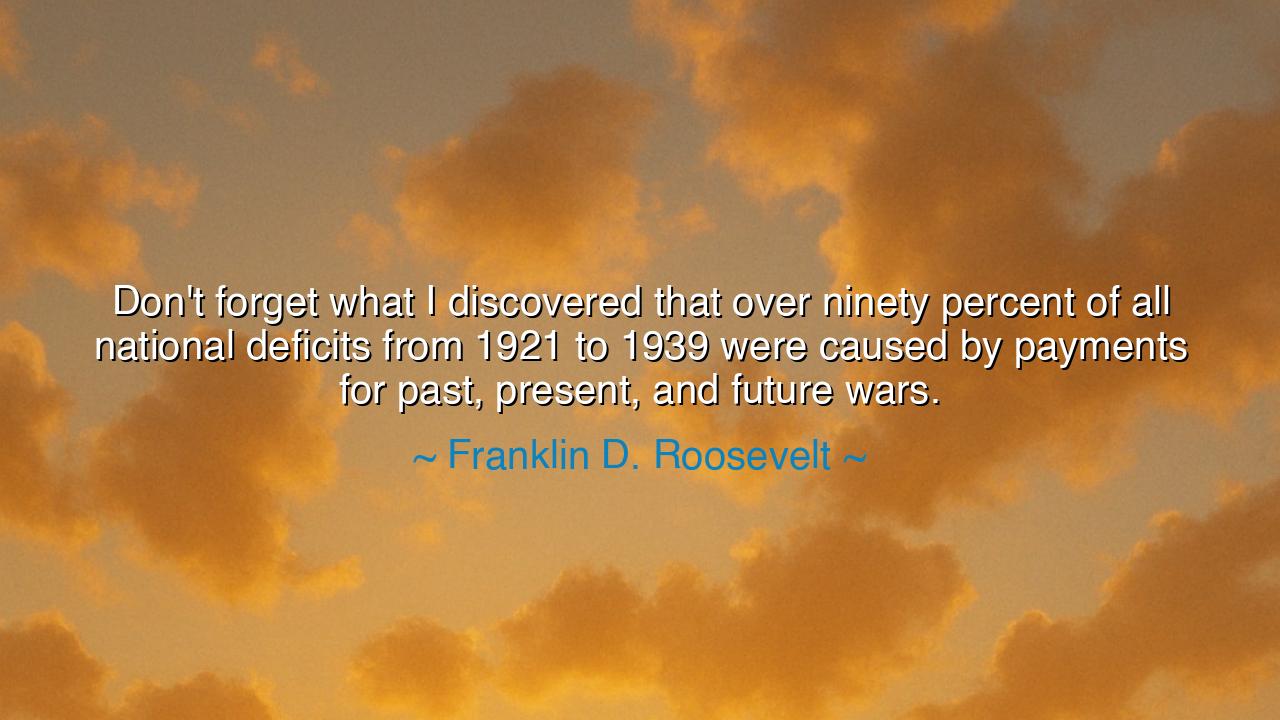
Don't forget what I discovered that over ninety percent of all
Don't forget what I discovered that over ninety percent of all national deficits from 1921 to 1939 were caused by payments for past, present, and future wars.






Do not forget, the words of Franklin D. Roosevelt ring through time: "Over ninety percent of all national deficits from 1921 to 1939 were caused by payments for past, present, and future wars." How these words echo the wisdom of ages, reminding us of the eternal cost of war—the price that nations pay not only in the blood of their people but also in the debt that burdens future generations.
Let us journey back to the years of the early 20th century, a time when the world stood upon the precipice of profound change. The scars of the Great War (World War I) were still fresh upon the soul of humanity. The nations of the world, weary from the bloodshed and the devastation, had begun to rebuild. Yet, even as they sought peace, the shadow of future conflicts loomed large, casting its long, dark hand over the future. In the years from 1921 to 1939, national deficits grew at an alarming rate, driven by the insatiable demands of war debts.
Roosevelt’s words call us to reflect on the legacy of war—how the toll of armed conflict does not fade with the signing of treaties or the laying down of arms. The debts incurred, the loans taken to fund destruction, linger on like ghosts, haunting the economies of nations long after the final shot is fired. These words were not just a historical observation but a warning, a solemn reminder of how future generations inherit not only the legacies of war but also the burdens of financing it.
Consider, for instance, the Great Depression, which began in 1929. The world, still grappling with the aftermath of the First World War, found itself trapped in a spiral of economic despair. Global economies, including that of the United States, struggled under the weight of war reparations and the costs of rebuilding. Nations, rather than investing in the prosperity of their people, had diverted their resources toward the endless machine of war, setting in motion a cycle of deficits that would not be broken until the dawning of another conflict.
Reflect upon the cost of conflict through the lens of history. In ancient times, when the mighty empires of Rome and Greece waged war upon their neighbors, their people too felt the strain of these endeavors. Alexander the Great, in his quest to conquer the known world, left behind not only a legacy of glory but also vast debts that drained the treasuries of his successors. Similarly, the Roman Empire faltered under the weight of its military campaigns, its coinage devalued by the constant need for soldiers, weapons, and the infrastructure of war. The cost of empire-building was not only measured in soldiers’ lives but in the debt that could never truly be repaid.
What can we learn from these ancient truths and Roosevelt’s warning? The lesson is clear: War is costly, not only in terms of lives lost but in the economic burden it places upon nations. Each conflict, each war, and each battle carries with it the weight of future generations, who must carry the debt of their forebears. The price of war is never truly paid in full—it is passed down like an inheritance of destruction, a burden that the innocent must bear.
So, what action must we take? Let us heed Roosevelt's call and work toward a future where the costs of war are no longer the costs of peace. Let us invest in the prosperity of the people, in education, healthcare, and infrastructure, rather than in the instruments of destruction. Let us build a world where the strength of nations is measured not by the might of their armies, but by the well-being of their people. For, as history teaches us, the true measure of a nation’s greatness lies not in its ability to wage war, but in its capacity to foster peace and prosperity for all. Do not forget, for the lessons of the past are the seeds for the future.






AAdministratorAdministrator
Welcome, honored guests. Please leave a comment, we will respond soon